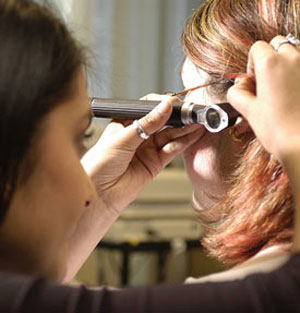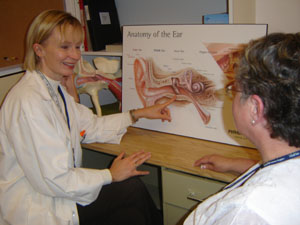Audiologist
Tasks & duties

Audiologists may do some or all or the following:
-
study, identify and measure hearing problems
-
assess how brain processes affect people's hearing (neurophysiology)
-
prescribe, select and fit hearing aids
-
show clients how to use hearing aids
-
advise on hearing problems
-
counsel patients, families, employers and educators about hearing
-
educate and advise about hearing conservation
-
assist patients with rehabilitation after an accident or condition that caused hearing loss
-
conduct research into hearing problems
-
do assessments of workplace and classroom sound levels
-
teach children with learning disabilities related to hearing how to manage in the classroom
-
work for hearing aide companies
-
work in cochlear implant programmes
Specialisations
Audiologists may specialise in a particular area, such as neurophysiology, where hearing loss is assessed by examining the brain function, either using electrophysiology or behavioural measurements.
Skills & knowledge

Audiologists need to have:
-
an understanding of normal hearing and hearing problems
-
up-to-date knowledge of research on hearing problems
-
knowledge of the structure and function of the ear and brain
-
knowledge of acoustics and physics
-
knowledge of psychology
-
knowledge of child development
-
communication and people skills
-
the ability to use technical equipment.
-
computer skills to program hearing aids.
-
planning and research skills
Some knowledge of sign language may also be helpful.
Entry requirements
To become an audiologist you need to have a Master of Audiology. This course is only available at the University of Auckland and the University of Canterbury.
Secondary education
A tertiary entrance qualification is needed to enter further training. Useful subjects include biology, physics and English.
Tertiary education
To enter the Master of Audiology you need to have an undergraduate degree such as a Bachelor of Arts or Science, preferably in physiology and/or psychology, or a Bachelor of Speech-Language Therapy.
Training on the job
Audiologists gain many skills on the job. They need to keep up to date with new research and equipment.
Registration
Audiologists must be members of the NZ Audiological Society and have a Certificate of Clinical Competence. To get this an audiologist needs to complete a minimum of 11 months supervised work, with clinical and theory tests.
Useful experience
Any work with people provides useful experience for audiologists. Work experience in nursing homes or with people who have hearing impairments is also helpful.
Related courses
Audiology
Speech Pathology
For more information, please refer to Career Services.
Document Actions
